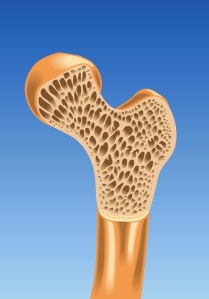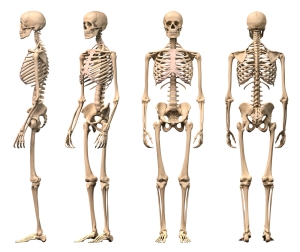
When Conservative MP Sarah Newton, 51, was diagnosed with the fragile bone disease osteoporosis after falling outside the House of Commons she was stunned.
Mrs Newton had broken her hip in a simple fall and told newspapers how shocked she was to have an “old women’s disease”.
Osteoporosis is a fragile bone disease which can cause the bone structure to become weak and porous, making bone prone to fractures.
Like most people with osteoporosis, Mrs Newton was only diagnosed after suffering a fall and breaking a bone. It’s a common scenario; most women (and men) diagnosed with osteoporosis in the UK are over 50, there are three million people with the disease in the UK. Between them they suffer around 230,000 painful fractures every year. There’s no routine screening for osteoporosis in your 50s and beyond as there is for breast cancer – even though osteoporosis affects such huge numbers.
Not just an “old women’s disease”
Fractures mainly happen in the over 65s but did you know the damage that causes bones to weaken can start years before – even as far back as your teens? And that women in their 20s, 30s, and 40s, can actually have the bone ages of much older women?
Although the main risk factors for developing osteoporosis are age (one in two women over 50 have the disease), and losing the protection of the bone strengthening hormone oestrogen after the menopause , there are other risk factors too. These include having a mother with a history of hip fracture, suffering fractures yourself from minor falls/incidents, early menopause or hysterectomy, lack of calcium in your diet, vitamin D deficiency, eating disorders , rheumatoid arthritis, side effects of steroid drugs, over training (to the extent that your periods stop), thyroid problems and lack of weight-bearing exercise , as well as coeliac disease.
How old are YOUR bones?
 I’ve been writing about the risks of developing osteoporosis in younger women in a feature in today’s Daily Mail Good Health section http://www.dailymail.co.uk/health/article-2235473/Brittle-bones-Are-bones-older-Brittle-bones-arent-just-problem-old-age-As-women-discovered-damage-start-DECADES-earlier.html We sent six women in their thirties and forties for a DXA bone scan to test their bone density – and in some cases got some very surprising results. Three of the women actually turned out to have osteopenia – a low bone density condition that can lead to osteoporosis – something they were completely unaware of. All of them said they were grateful they’d found out now before it was too late to do something about it.
I’ve been writing about the risks of developing osteoporosis in younger women in a feature in today’s Daily Mail Good Health section http://www.dailymail.co.uk/health/article-2235473/Brittle-bones-Are-bones-older-Brittle-bones-arent-just-problem-old-age-As-women-discovered-damage-start-DECADES-earlier.html We sent six women in their thirties and forties for a DXA bone scan to test their bone density – and in some cases got some very surprising results. Three of the women actually turned out to have osteopenia – a low bone density condition that can lead to osteoporosis – something they were completely unaware of. All of them said they were grateful they’d found out now before it was too late to do something about it.
I’m not suggesting for a minute that all healthy younger women start storming their GP practices demanding bone scans; but greater awareness of the risk factors so you can take positive steps to strengthen your bones before it’s too late, is surely a sensible punt. Consultant rheumatoloigst Dr Alex Brand from the NHS Chelsea and Westminster Hospital and private Lister Hospital , Chelsea, says it’s just like realising you have high cholesterol or high blood pressure in your 40s and then taking steps to bring both down to prevent heart disease in later life.
How can you strengthen your bones?
Although pre-menopausal women can’t be prescribed bone strengthening drugs – what they can do is take more weight-bearing exercise (that’s any exercise which supports the weight of your own body and includes brisk walking, jogging, tennis, aerobics, dancing and lifting weights), to help strengthen their bones.
Younger women can also eat a calcium-rich diet; calcium is found in milk, yoghurt, cheese, leafy greens, bony fish and dried fruit), stop smoking (which has a toxic effect on bone), moderate their alcohol consumption to within safe limits and make sure they get exposure to the sun to ensure their body makes enough vitamin D ( vital for calcium absorption). They may even consider taking a calcium and vitamin D supplement. If they’ve had a premature menopause or early hysterectomy they can take Hormone Replacement Therapy to strengthen their bone density.
If you’re under 50 and are worried you have some of the risk factors for osteoporosis though – it’s probably worth checking out this quiz on the National Osteoporosis Society website http://www.nos.org.uk/page.aspx?pid=1157&srcid=263.
If you’re scoring high for risk factors have a chat with your GP – they now have a computerised screening tool called FRAX (http://www.shef.ac.uk/FRAX) developed by the World Health Organisation and the University of Sheffield ,which calculates your risk of having a fracture within the next 10 years. If your risk score for a fracture is high you may need a DXA bone density scan.
Bones get porous as you age … so start taking care of them now.
Click here to read another article I’ve written about osteoporosis http://www.dailymail.co.uk/femail/article-2053545/Fatal-toll-fragile-bones–women-suffer-osteoporosis.html



Thanks for a really informative feature. It has everything in it I need to know – like more exercise and more calcium.
Thanks Lesley – great to have a reader!